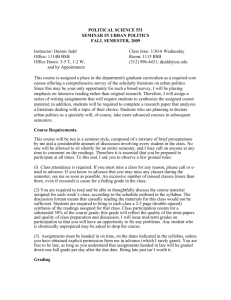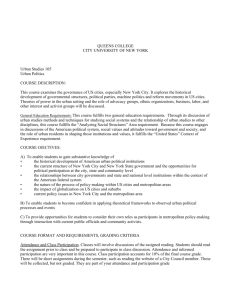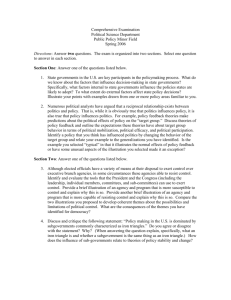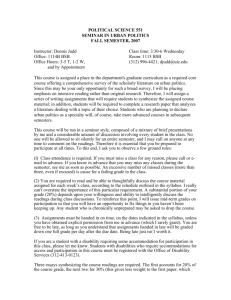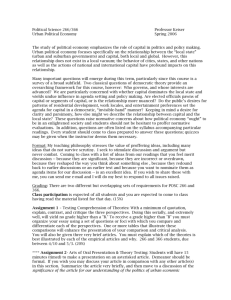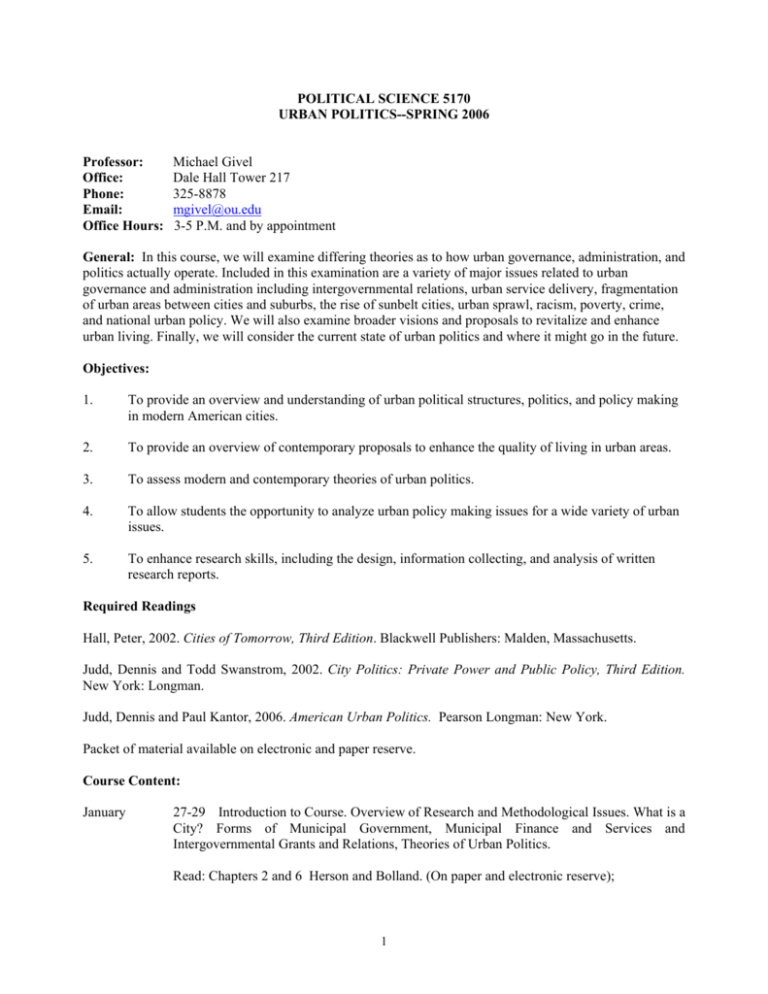
POLITICAL SCIENCE 5170
URBAN POLITICS--SPRING 2006
Professor:
Office:
Phone:
Email:
Office Hours:
Michael Givel
Dale Hall Tower 217
325-8878
mgivel@ou.edu
3-5 P.M. and by appointment
General: In this course, we will examine differing theories as to how urban governance, administration, and
politics actually operate. Included in this examination are a variety of major issues related to urban
governance and administration including intergovernmental relations, urban service delivery, fragmentation
of urban areas between cities and suburbs, the rise of sunbelt cities, urban sprawl, racism, poverty, crime,
and national urban policy. We will also examine broader visions and proposals to revitalize and enhance
urban living. Finally, we will consider the current state of urban politics and where it might go in the future.
Objectives:
1.
To provide an overview and understanding of urban political structures, politics, and policy making
in modern American cities.
2.
To provide an overview of contemporary proposals to enhance the quality of living in urban areas.
3.
To assess modern and contemporary theories of urban politics.
4.
To allow students the opportunity to analyze urban policy making issues for a wide variety of urban
issues.
5.
To enhance research skills, including the design, information collecting, and analysis of written
research reports.
Required Readings
Hall, Peter, 2002. Cities of Tomorrow, Third Edition. Blackwell Publishers: Malden, Massachusetts.
Judd, Dennis and Todd Swanstrom, 2002. City Politics: Private Power and Public Policy, Third Edition.
New York: Longman.
Judd, Dennis and Paul Kantor, 2006. American Urban Politics. Pearson Longman: New York.
Packet of material available on electronic and paper reserve.
Course Content:
January
27-29 Introduction to Course. Overview of Research and Methodological Issues. What is a
City? Forms of Municipal Government, Municipal Finance and Services and
Intergovernmental Grants and Relations, Theories of Urban Politics.
Read: Chapters 2 and 6 Herson and Bolland. (On paper and electronic reserve);
1
Read: Chapter 1, 12, Judd and Swanstrom; and Eisenger: City Politics in an Era of Federal
Devolution. (On paper and electronic reserve)
Read: Judge: Pluralism; Harding: Elite Theory and Growth Machines; Logan, Whaley and
Crowder: The Character and Consequences of Growth Regimes; Schumaker: Estimating
the First and (Some of the) Third Faces of Community Power; Manley: Neo-Pluralism: A
Class Analysis of Pluralism I and Pluralism II; and Clark: Structural Realignments in
American City Politics
February
24-26 Issues and Theories in Urban Planning, Private City and Local Democracy: Political
Legacy of the 19th Century, Urban Political Machines and Reform Movements, New Deal
Impact on Cities.
Read: Chapters 1-7 and 11-12 Hall;
Read: Chapter 2-5, Judd and Swanstrom; and
Read: Lineberry and Fowler: Reformism and Public Polices in American Cities; and
Gordon: Immigrants and Urban Governmental Form in American Cities, 1933-60 (On
paper and electronic reserve)
March
24-26 National Urban Policy and the Divided Metropolis, Rise and Fall of National Urban
Policy, Urban Sprawl and Revitalizing the Cities, Central Cities, Suburbs, and Sunbelt
Cities.
Read: Chapters 7-11 and 13-15, Judd and Swanstrom
Final Papers Due March 25, 2006.
Final Exam on March 26, 2006
Grades:
Chapter/Article Discussion and Written Analysis:
Research Paper:
Final Exam:
30%
40%
30%
Total:
100%
Chapter or Article Discussions and Written Analysis: Students will be expected to actively lead one
discussion of a chapter in the Judd and Kantor book: American Politics: The Reader. Evaluation will be
based on how well the material is understood, debated, and questions are answered. Evaluation will also be
based on a written three page or less summary of the assigned article or chapter, which should include a
short analysis of the article and its strengths and weaknesses. The grade for this assignment will be a
combination of the points received for the oral presentation (15 points) and written summary (15 points).
Research Paper: Students will select a urban politics issue or theory from the readings or class such as
urban planning, urban sprawl, economic development, or transportation and write an academic-style paper.
All papers should be typewritten and double-spaced in 11 or 12-point font with one-inch margins. You
should also utilize the American Psychological Association (APA) or Chicago Manual of Style or MLA
formats in relation to style and format for such items as footnotes, bibliography, and so on. I will also take
off some points for consistently improper grammar or spelling. Papers should be a minimum of 20 full pages
2
with title page, abstract, references and appendices not counting in the page count. All material that is
quoted or not original should have an appropriate footnote or endnote.
Final Exam: This is a closed book essay style examination that will cover the entire course. In this exam,
you will be responsible for all materials covered in reading assignments and class lectures.
Attendance and Tardiness: All students are expected to attend all scheduled class sessions on time.
Assignments and Tests: All assignments must be submitted on time in order to complete the course
successfully. If you turn an assignment in after the date that it is due, and you do not have a valid reason for
its late submittal, proportional points in relation to how late it is submitted will be deducted from the
assignment. There are no extra credit assignments in this course. Make-up exams may be scheduled upon
good cause reasons given by the student and approved by the instructor on a case-by-case basis. If there is
not a good cause for an exam not being taken at its scheduled time, that exam cannot be made-up at a later
date. All students are expected to complete the required reading assignments before the class period that the
reading assignment is assigned.
Accommodation for Students With Disabilities: Any student in this course who has a disability that may
prevent her or him from fully demonstrating her or his abilities should contact me personally as soon as
possible so we can discuss accommodations necessary to ensure full participation and facilitate your
educational opportunities.
Religious Observance: It is the policy of the University to excuse absences of students that result from
religious observances and to provide without penalty for the rescheduling of examinations and additional
required class work that may fall on religious holidays.
Electronic Devices: All audible electronic devices, including but not limited to cell phones and beepers,
must remain off at all times while the class is in session.
Cheating and Plagiarism: Any student who willfully violates the cheating and plagiarism policy may be
subject to disciplinary proceedings within the scope of university due process grievance and hearing rights.
3


